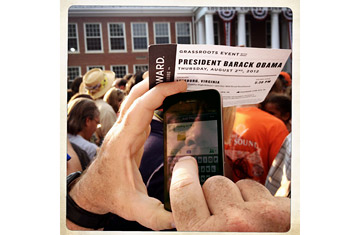
A supporter sends a photo on his mobile phone during a campaign rally for U.S. President Barack Obama at Loudoun County High School in Leesburg, Virginia.
(2 of 3)
The result is a blizzard of innovations, many of which will be tested for the first time in this presidential campaign. The Obama camp has deployed a new program, Quick Donate, that allows people to give repeat donations by simply sending the number of dollars by text message. Though the return rate is a campaign secret, Obama officials say people are much more likely to give again when they don't have to re-enter their credit-card information. In the coming months, the Federal Election Commission is on track to approve a request from presidential campaigns to allow cell-phone carriers to serve as middlemen for low-dollar donations, eliminating the need to enter credit-card information even for the first donation.
Mobile digital campaigning is also changing political advertising, allowing candidates to woo voters while they wait in line at the supermarket and to target people with advertising when they attend large gatherings. On the first weekend in August, for example, tens of thousands of young people gathered near Grant Park in Chicago for a concert featuring Jack White, the Red Hot Chili Peppers and the electronic-dance phenom Avicii. As a thunderstorm approached, many checked the weather on their phones, only to find at the top of the screen a display ad with a picture of kids dancing at a concert, overlaid by the words "Obama failed us. We can do better." The ads were seen only by those at the concert and in the immediate vicinity. "We weren't paying for the entire city of Chicago," says Patrick Ruffini, the Republican digital consultant for Crossroads Generation, a conservative group that targets young people. Campaigns now have the ability to place mobile ads, often at a discount from desktop ads, anywhere large groups of targeted voters are gathering--on a college campus, at a NASCAR race or even at a parade in a swing neighborhood. "You will see a lot more of this in swing states," he predicted.
In July, Mitt Romney's campaign persuaded hundreds of thousands of supporters to download a mobile app that promised to inform them "first" about his vice-presidential pick. The promise proved empty, since the news media broke word of the announcement hours before the app sent Paul Ryan's name, but the Romney campaign collected valuable data on its most committed supporters and can send push notifications to their phones throughout the campaign. Romney officials promise more app functionality in the coming weeks.
Obama's new app is intended to be used primarily by occasional, self-directed volunteers. Most canvassing will still be undertaken by regular staffers and volunteers with clipboards and paper, and responses will be entered later into the campaign's database. But the campaign has options it has not yet exercised. It could, for example, cross-reference the friends lists of Facebook supporters using its app against the Democratic voter file to better target potential voters who might not be planning to vote. Wary of possible complaints of privacy invasion, neither the Romney nor the Obama campaign has yet announced how far it will push the new data-gathering side of mobile technology.
